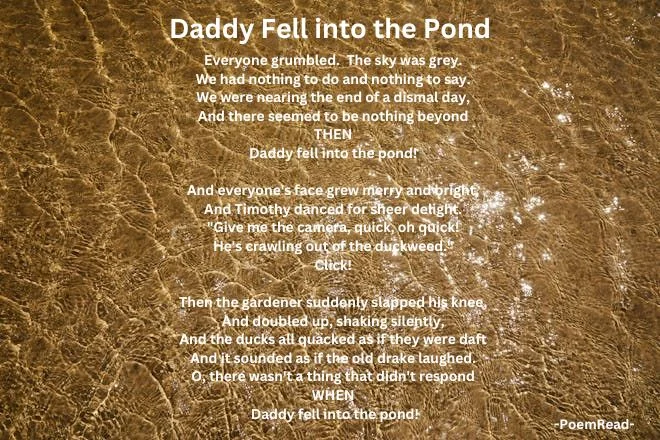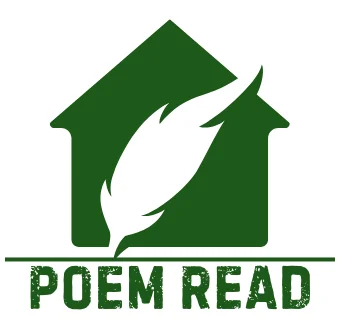
“Daddy Fell into the Pond” by Alfred Noyes: An Analysis
“Daddy Fell into the Pond” by Alfred Noyes is a whimsical journey celebrating life’s unexpected joys. Set against the backdrop of the early 20th century, the poem humorously narrates a father’s accidental fall into a pond. This incident transforms a dull day into one filled with laughter and merriment.
Through playful language, vivid imagery, and strategic use of poetic devices, Noyes crafts a rhythmic and engaging narrative. This narrative highlights the power of spontaneity and the universal experience of finding joy in shared laughter. Ultimately, the poem leaves readers with a heartwarming reminder to cherish life’s simple moments.
Daddy Fell into the Pond
Everyone grumbled. The sky was grey.
We had nothing to do and nothing to say.
We were nearing the end of a dismal day,
And there seemed to be nothing beyond
THEN
Daddy fell into the pond!
And everyone's face grew merry and bright,
And Timothy danced for sheer delight.
"Give me the camera, quick, oh quick!
He's crawling out of the duckweed."
Click!
Then the gardener suddenly slapped his knee,
And doubled up, shaking silently,
And the ducks all quacked as if they were daft
And it sounded as if the old drake laughed.
O, there wasn't a thing that didn't respond
WHEN
Daddy fell into the pond!
Content
- About the Author: Alfred Noyes
- The Subject of "Daddy Fell into the Pond"
- Context of "Daddy Fell into the Pond"
- Theme and Tone of “Daddy Fell into the Pond”
- Form and Structure of “Daddy Fell into the Pond”
- Line-by-Line Analysis of "Daddy Fell into the Pond"
- Poetic and Literary Devices Used in "Daddy Fell into the Pond"
- Implications and Meanings of "Daddy Fell into the Pond"
- Interactive Summary of "Daddy Fell into the Pond"
About the Author: Alfred Noyes
Alfred Noyes, born on September 16, 1880, in Wolverhampton, England, was a renowned English poet and playwright. He gained recognition for his lyrical poetry and his ability to evoke emotions through his words. Noyes was a prolific writer, and his works often explored themes of nature, love, and the human experience.
He received critical acclaim for his poem “The Highwayman,” which remains one of his most famous works. Noyes’ writing style is characterized by its rhythmic flow, rich imagery, and use of vivid language.
The Subject of “Daddy Fell into the Pond”
The subject of the poem “Daddy Fell into the Pond” by Alfred Noyes is a humorous incident involving a father who accidentally falls into a pond. This seems like an ordinary incident that takes place on a dull and dreary day. The poem captures the sudden transformation of the atmosphere and the resulting joy and laughter that ensue when the father falls into a pond.
Furthermore, it portrays the power of unexpected events to bring happiness and excitement into our lives, even in the most mundane situations. The poem captures the lightheartedness of the situation and the reactions of the speaker and the other characters involved.
In addition, the poem touches on the theme of family dynamics and the bond between a father and his children. The children’s laughter and delight at their father’s misfortune reveal a close-knit relationship filled with love and playfulness.
It reminds us of the importance of cherishing these precious moments with our loved ones and finding joy in the shared experiences. Through vivid descriptions and playful language, Noyes paints a comical picture of the event, inviting readers to laugh along with the mishap.
Context of “Daddy Fell into the Pond”
The Early 20th Century Literary Scene
The early 1900s were a time of significant change in the literary world. The Victorian era had come to an end, and with it, its strict moral codes and idealized portrayals of life. Modernism was on the rise, bringing with it a sense of disillusionment and a challenge to traditional forms. During this period, poets were experimenting with new styles and themes. They often focused on the inner workings of the mind and the complexities of a rapidly changing world.
Alfred Noyes and His Place in Poetry
Alfred Noyes stood somewhat apart from the modernist movement. His poetry often echoed the romanticism of the 19th century, with its clear rhythms, straightforward narratives, and a focus on storytelling. “Daddy Fell into the Pond” is a perfect example of this. While other poets were exploring the angst and fragmentation of the post-war world, Noyes wrote a poem that discovered humor and joy in everyday life.
The Cultural Context
The poem’s setting is nondescript, which allows it to be timeless and relatable to any reader. However, the simplicity of the scene reflects a society connected to the joys of family life and the natural world. It captures a moment from the early 20th century when there was still space for simple pleasures, despite advancements and complexities.
The Poem as a Reflection of Society
“Daddy Fell into the Pond” can also be seen as a subtle commentary on the need for levity in times of monotony or hardship. The early 1900s were not without their troubles, and Noyes’ poem serves as a reminder that joy can be found in the most unexpected places, often in the form of shared experiences that bring people together.
In essence, the context of “Daddy Fell into the Pond” is one that juxtaposes the simplicity of a bygone era with the complex emotions of a modernizing world. It’s a poem that celebrates the universal human experience of finding laughter and connection, even on the grayest of days. This context is crucial for understanding the poem’s enduring appeal and its place in the canon of early 20th-century literature.
Theme and Tone of “Daddy Fell into the Pond”

Theme: The Joy of Life’s Unexpected Moments
“Daddy Fell into the Pond” by Alfred Noyes is a poem that celebrates the unexpected moments that bring laughter and joy into our lives. The central theme is the delight found in life’s surprises, which can transform an ordinary, dull day into one filled with happiness and merriment. The poem suggests that these spontaneous incidents, however trivial they may seem, have the power to unite people and create cherished memories.
Tone: Playful and Uplifting
The tone of the poem is undeniably playful and uplifting. Noyes uses light-hearted language and imagery to depict the scene, ensuring that the reader is drawn into the humor of the situation. The poem’s rhythm and rhyme contribute to a cheerful and buoyant atmosphere, inviting the reader to share in the family’s amusement.
The poem’s tone also reflects a certain warmth and affection. The family’s reaction to the father’s mishap is not one of concern or embarrassment but of shared joy. This response highlights the poem’s underlying message about the value of family and the communal experience of joy.
In summary, “Daddy Fell into the Pond” is a poem that uses its theme and tone to remind us of the beauty of life’s unplanned moments. It encourages us to embrace these instances with laughter and to appreciate the way they can brighten our days and bring us closer to those around us.
Form and Structure of “Daddy Fell into the Pond”
Alfred Noyes’ poem “Daddy Fell into the Pond” is a whimsical piece that uses form and structure to enhance its storytelling and comedic effect. Here’s a closer look at these elements:
Stanzas
The poem is structured into three stanzas, each with a different length and purpose. The first stanza sets the scene of a dull day, the second captures the moment of the fall, and the third describes the reaction of those around.
Rhyme Scheme
The rhyme scheme of the poem varies with each stanza, which adds to the playful nature of the poem. The first stanza follows an AAABCB pattern, creating a sense of anticipation. The second stanza’s AABB pattern delivers the punchline with a rhythmic flair. The third stanza uses an AABBCDC pattern, which brings a satisfying conclusion to the narrative.
Rhythm and Meter
Noyes employs a consistent meter throughout the poem, which gives it a musical quality. The meter of Alfred Noyes’ poem “Daddy Fell into the Pond” is iambic tetrameter. This means that each line typically has eight syllables, with every second syllable being stressed, creating a rhythmic and musical quality to the poem.
This meter contributes to the playful and light-hearted rhythm that complements the humorous content of the poem. This rhythm, combined with the rhyme, makes the poem memorable and engaging, inviting readers to recite it aloud.
Line Breaks and Punctuation
The poem features strategic line breaks that guide the reader’s pace and create suspense, particularly before the words “THEN” in the first stanza and “WHEN” in the second. The punctuation is minimal, which allows the events to unfold in a quick and natural manner. This reflects the spontaneity of the incident.
Use of Enjambment
Enjambment, or the continuation of a sentence without a pause beyond the end of a line, is used effectively in the poem to maintain a conversational tone and keep the narrative flowing smoothly.
In summary, the form and structure of “Daddy Fell into the Pond” are carefully crafted to support the poem’s lighthearted theme. The varied rhyme schemes and rhythmic patterns work together to create a lively and amusing piece that captures the reader’s imagination, leaving a lasting impression. The poem’s structure invites readers of all ages to enjoy the humor and simplicity of a moment that turns an ordinary day into an extraordinary memory.
Line-by-Line Analysis of “Daddy Fell into the Pond”
“Everyone grumbled. The sky was grey.”
In these opening lines, the poet sets the scene by describing the general mood of the characters and the dreary weather. The repetition of the “g” sound in “grumbled” and “grey” creates a sense of discontent and monotony. It suggests that the characters are dissatisfied with their current situation and that the weather is adding to their gloomy outlook.
The choice of the word “everyone” also implies that this feeling of dissatisfaction is universal, affecting all those present in the scene. Furthermore, the simplicity of the language and the use of common imagery make the scene relatable and easily visualized by the reader.
“We had nothing to do and nothing to say.”
These lines further emphasize the boredom and lack of activity that the characters are experiencing. The repetition of “nothing” adds to the sense of emptiness and ennui. It suggests that the characters are devoid of any meaningful occupation or conversation, contributing to their overall dissatisfaction. The use of the pronoun “we” creates a sense of unity among the characters, highlighting their shared experience of idleness and lack of purpose.
“We were nearing the end of a dismal day”, “And there seemed to be nothing beyond,”
These lines highlight the approaching end of the day and the feeling of hopelessness that accompanies it. The repetition of “nothing” reinforces the idea of a lack of excitement or prospects for the characters. It suggests that the characters’ current state of discontent is not temporary but rather a reflection of their overall perception of life. The use of the word “dismal” further emphasizes the bleakness of their situation, painting a picture of a day filled with disappointment and despair.
“Then”
The capitalized “THEN” serves as a dramatic pivot. It’s a turning point that interrupts the dreariness, signaling a change in the narrative.
“Daddy fell into the pond!”
This line marks the turning point of the poem. The sudden event of the father falling into the pond brings about a dramatic change in the atmosphere and the mood of the characters. It introduces an element of surprise and unexpectedness, disrupting the stagnant state that the characters were in. The exclamation mark at the end of the line adds to the sense of excitement and astonishment, emphasizing the significance of this event in the narrative.
“And everyone’s face grew merry and bright”, “And Timothy danced for sheer delight.”
These lines depict the immediate reaction of the characters to the father’s fall. The use of the words “merry,” “bright,” and “sheer delight” conveys the joy and happiness that suddenly fill the air. It implies that the characters’ initial discontent and boredom have given way to a sense of amusement and excitement. The mention of Timothy dancing highlights the infectious nature of this newfound joy, as even the youngest member of the group is caught up in the moment.
“‘Give me the camera, quick, oh quick!,” “He’s crawling out of the duckweed.’ Click!”
These lines capture the excitement and urgency of capturing the moment when the father emerges from the pond. The use of the word “quick” and the repetition of the “k” sound in “quick” and “click” add to the fast-paced and lively tone of the poem.
It suggests that the characters are eager to immortalize this unexpected event, wanting to preserve the memory of the father’s fall and subsequent emergence. The use of the word “camera” also places the poem in a specific time period, indicating that this is a modern setting where capturing moments on film is possible.
“Then the gardener suddenly slapped his knee”, “And doubled up, shaking silently”, “And the ducks all quacked as if they were daft”, “And it sounded as if the old drake laughed.”
These lines describe the reaction of the gardener and the ducks to the father’s fall. The gardener’s laughter and the ducks’ quacking contribute to the overall sense of merriment and amusement. The repetition of the “s” and “d” sounds in these lines adds a playful and musical quality to the poem. It suggests that the joy and laughter brought about by the father’s fall are contagious, spreading to those around him and even to the animals in the scene. The mention of the old drake laughing further emphasizes the comical nature of the event. It shows that even the normally stoic and serious duck cannot resist joining in the merriment.
“Then the gardener suddenly slapped his knee,”: This action is a common expression of amusement or disbelief. The gardener’s reaction is spontaneous and physical, emphasizing the humor of the situation.
“And doubled up, shaking silently,”: The gardener is laughing so hard that he bends over and shakes. The use of “silently” suggests that his laughter is internalized. This could be because he is trying to maintain some decorum or because he is laughing too hard to make a sound.
“And the ducks all quacked as if they were daft”: The ducks’ quacking adds to the chaotic and comical scene. “As if they were daft” implies that their reaction is silly or senseless, which fits the absurdity of the moment.
“And it sounded as if the old drake laughed.”: The personification of the drake suggests that even the duck finds the situation funny. This adds to the whimsical tone of the poem.
“O, there wasn’t a thing that didn’t respond”, “When Daddy fell into the pond!”
In the final lines of the poem, the poet emphasizes the all-encompassing impact of the father’s fall. Every element of the scene, from the people to the ducks, is affected and responds with joy and laughter. It suggests that this event has brought about a moment of unity and shared happiness, transcending any previous feelings of boredom or discontent.
The use of the word “respond” implies that the characters and the environment are in tune with each other, creating a harmonious and vibrant atmosphere. The exclamation mark at the end of the poem emphasizes the significance of this event. It leaves the reader with a sense of the transformative power of unexpected moments in life.
Poetic and Literary Devices Used in “Daddy Fell into the Pond”

“Daddy Fell into the Pond” incorporates several poetic and literary devices to enhance its meaning and impact. Some of these devices include:
Repetition
The repetition of certain words and sounds, such as “nothing,” “quick,” and the “k” and “d” sounds, creates a rhythmic and musical quality. This repetition serves to emphasize the chaos and urgency of the situation. Furthermore, it mimics the splashing and commotion that occur when someone falls into a pond. It also adds a sense of unity and cohesion to the poem, tying together different elements and ideas.
Internal Rhyme
The poem incorporates internal rhyme in phrases like “quick, oh quick” and “daft” and “laughed,” adding to the playful and lively tone. The use of internal rhyme not only adds musicality to the poem but also creates a sense of harmony and balance. It helps to create a sense of continuity and flow, making the poem more engaging and enjoyable to read.
Imagery
The poet uses vivid imagery to paint a picture of the scene, evoking emotions and creating a sense of atmosphere. For example, the line “The water splashed and the children laughed” conjures up a mental image of the water splashing and the children’s joyous laughter. This imagery helps to bring the poem to life and allows the reader to visualize the events described. It also adds depth and richness to the poem, making it more memorable and impactful.
Metaphor
Another literary device used in “Daddy Fell into the Pond” is metaphor. The poet compares the father’s fall into the pond to a “great big splosh.” This metaphor not only adds a touch of humor to the poem but also helps to convey the suddenness and magnitude of the event. It allows the reader to understand the impact of the father’s fall and the ensuing chaos in a more vivid and imaginative way.
Meter
The poem is predominantly written in iambic tetrameter, giving it a rhythmic and bouncy quality that enhances the comedic effect.
Refrain
The line “Daddy fell into the pond!” is repeated, functioning as a refrain that emphasizes the central event of the poem.
Personification
The poem personifies the ducks and the old drake, giving them human-like reactions to the event. This adds to the whimsy of the poem.
Assonance
The repetition of vowel sounds, as in “We had nothing to do and nothing to say,” creates a musical effect that complements the poem’s light-hearted tone.
Enjambment
The use of enjambment contributes to the poem’s conversational style and natural flow. It allows sentences and phrases to run onto the next line, creating a seamless rhythm.
Hyperbole
The exaggerated reactions of the characters, including the animals, to Daddy’s fall into the pond serve as hyperbole. This amplifies the humor in the poem.
Alliteration
The poem also features alliteration in lines like “Daddy fell into the pond,” which adds to the poem’s rhythm and memorability.
Onomatopoeia
The use of words that imitate sounds, such as “quacked” and “laughed,” adds a lively auditory element to the reading experience.
Implications and Meanings of “Daddy Fell into the Pond”
“Daddy Fell into the Pond” carries several implications and meanings that resonate with readers on a deeper level. Let’s explore these implications in detail:
Power of Unexpected Events
The poem underscores the transformative power of unexpected events to bring joy and laughter into our lives. It highlights how a seemingly mundane day can be turned around by a moment of spontaneity and amusement.
Embracing Spontaneity
Noyes encourages readers to embrace spontaneity and find happiness in the simplest of moments. The poem celebrates the beauty of living in the present and being open to the surprises that life has to offer.
Interconnectedness and Ripple Effect
By depicting how every element in the scene responds to Daddy’s fall, the poem symbolizes the interconnectedness of all things. It reminds us that our actions, no matter how small, can have a ripple effect on the world around us.
Unpredictability of Life
The father’s fall serves as a metaphor for life’s unexpected challenges and obstacles. The poem urges us to adapt and find joy in these moments, highlighting the resilience and flexibility needed to navigate life’s twists and turns.
Innocence of Childhood
The children’s laughter and excitement reflect the innocence and wonder of childhood. The poem encourages us to tap into our inner child, approaching life with curiosity, playfulness, and a sense of wonder.
Humor and Unity
“Daddy Fell into the Pond” speaks to the power of humor and laughter to bring people together. The shared experience of witnessing the father’s mishap creates a sense of unity and camaraderie among the onlookers. It highlights how laughter can bridge differences and foster connections among people.
Appreciating Small Moments
Ultimately, the poem reminds us to appreciate the small moments that brighten our days. It encourages us to find joy in the unexpected, cultivating a deeper appreciation for life’s simple pleasures and the laughter that binds us all together.
By exploring these implications and meanings, “Daddy Fell into the Pond” invites readers to reflect on several themes. These include the beauty of spontaneity, the interconnectedness of our world, and the enduring power of laughter to uplift and unite us.
Interactive Summary of “Daddy Fell into the Pond”
Let’s explore an interactive summary of Alfred Noyes’ poem “Daddy Fell into the Pond” through a series of questions and answers that highlight the key points and themes:
Q: What is the setting of the poem? The poem begins on a dull, grey day where everyone is grumbling and there’s a general sense of boredom.
Q: What event changes the mood of the day? : The mood shifts when Daddy unexpectedly falls into the pond, turning the dreary day into one filled with laughter and merriment.
Q: How do the family members react to Daddy falling into the pond? : The family members react with joy and amusement. Timothy asks for the camera to capture the moment, and the gardener laughs so hard that he doubles up.
Q: What is the significance of the ducks and the old drake in the poem? : The ducks and the old drake add to the humor of the situation. Their quacking and the suggestion that the old drake laughed personify nature, demonstrating that everyone is sharing in the joy of the moment.
Q: What themes are conveyed through this poem? : The poem conveys themes of joy found in simple, unexpected moments and the shared experience of laughter bringing people together.
Q: How does the poem end? : The poem concludes with the idea that everyone and everything around responded to Daddy’s fall, emphasizing the infectious nature of the laughter and joy that ensued.
Through this interactive summary, we can see that “Daddy Fell into the Pond” is a lighthearted poem that celebrates the spontaneous moments of happiness that can brighten a gloomy day. It reminds us to appreciate the little surprises life offers and to find joy in the laughter they bring.
For more of our poem reviews on the beauty of various aspects of life, please follow Life – PoemRead
RELATED POSTS
View all



